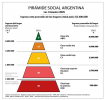No-one here seems concerned about how they will fare when they retire and have to live on an Argentine pension (assuming they have the requisite thirty years to receive anything). If they are expats under the age of 65 and still working they should keep in mind that they cannot make voluntary contributions to the US Social Security pension system. If they are from the UK voluntary contributions are allowed so they should be contributing. Living on a few hundred dollars a month is the reality for most Argentine pensioners. Could many expats adapt?
You are using an out of date browser. It may not display this or other websites correctly.
You should upgrade or use an alternative browser.
You should upgrade or use an alternative browser.
How many of us are still here?
- Thread starter El_fuego
- Start date
antipodean
Registered
- Joined
- Oct 20, 2019
- Messages
- 2,189
- Likes
- 3,365
I agree up to a point about Argentines. The poor and the working poor still struggle as they did before and are cutting back consumption as a result. The only up side is that at least don’t need to worry about their little money evaporating if they don’t spend it fast enough each month making manageability of their daily finances a little less traumatic and more predictable and also giving more hope things could improve.I honestly do not think that people earning salaries in pesos are doing great because raises have not kept up with inflation at all. There is a reason why pharmacies are selling less medication and supermarkets and grocery stores are having record low sales as well. The bottom line is that the big majority of people here ( and those are the ones earning pesos ) are not doing well, but are still somewhat hopeful. As for expats, retirees getting dollars are seeing the COL has increased significantly, but it may be worse back home and those that are still working and have average income in foreign currency can get by but are also feeling the impact of the lower exchange rate. The young single adventurous happy nomads living la vida loca on 2000 dollars a month are long gone.
On the other hand, it is no secret that air passenger numbers in Argentina are breaking all time records - both domestic and international. Now there are up to 4-7 daily flights to Miami and 5-6 daily flights to Madrid from Ezeiza at peak times - with even more coming at the end of the year - filled of course mostly by middle class Argentines most of whom collect a pay check from a job.
I had to hire a young communications professional the other day (a 20 something with less than 3 years experience) and was impressed to see the starting salaries for such a junior position are between $2k-$3k in the hand per month (for comparison the equivalent role and experience in Spain makes just over $1k in the hand per month) while someone with 5-10 years experience would go for around $4k per month. She too is already planning her trip to Mexico later in the year. I’m glad that some Argentine workers at least can already enjoy a lifestyle comparable to their peers working in more developed economies, and hope the number of such workers increases over time.
I had to hire a young communications professional the other day (a 20 something with less than 3 years experience) and was impressed to see the starting salaries for such a junior position are between $2k-$3k in the hand per month (for comparison the equivalent role and experience in Spain makes just over $1k in the hand per month) while someone with 5-10 years experience would go for around $4k per month.
I have a an Argentine friend (professional, early 30s) that two years ago was making $750 USD per month as a project manager for a big marketing agency. When she applied for a new job I taught her how to negotiate the $1000 offer to $1200. Fast forward and now she makes $3000 per month in the same company, and is applying to new jobs in the hope of earning even more.
I have no commentary other than... Holy cow that was fast.
How many people are collecting these salaries? 5% of the population? 1%?I have a an Argentine friend (professional, early 30s) that two years ago was making $750 USD per month as a project manager for a big marketing agency. When she applied for a new job I taught her how to negotiate the $1000 offer to $1200. Fast forward and now she makes $3000 per month in the same company, and is applying to new jobs in the hope of earning even more.
I have no commentary other than... Holy cow that was fast.
steveinbsas
Registered
- Joined
- Jul 27, 2006
- Messages
- 10,679
- Likes
- 6,968
If you lived on a farm in Argentina you would need a car.
I don't recall anyone who has ever posted in the forum that they live on an actual farm in Argentina and I think they would be far more likely to have a truck. I own a 1994 Peugeot 405gl. I drive it to the "center" of the local barrio twice a week to buy chicken. Twice a month i drive to Punta Alta to buy eggs, jeavy cream (27% fat), and butter. Everything else is delivered directly to my house by correo, now (as of yesterday) including whole milk; which I can buy in quantity (12 × 1 litro) at a lower cost, with free delivery, on Mercado Libre than any grocery store in Punta Alta
I prefer driving a passenger car on the highway and the cost of maintaining the 405 for the past fifteen years has been very reasonable.
I live in (what was described in the original ReMax listing which I viewed for the first time fifteen years ago) a "semi-rural" location. My property is actually within a residial zone and my house is almost exactly one km from the plaza of Villa General Arias.
I would never refer to my 2.5 acre property as a farm or finca. The common term to describe it is a quinta. I do not grow or harvest any crops and I don't own any livestock. Since the recent heavy rains, there is now a massive quantity of acelga growing in the back half of the property but I do not consme it. I give as much of it as possible to my friends and neighbors (all Argentine).
PS: one member suggested (perhaps in jest) that a horse could provide transpotation for someone living on a farm in Argentina While I have no desire to own (or even ride) a horse, I am happy to provide my closest neighbor's horse with all the grass she can eat.
According to the Income Pyramid, it would be about 22% of the population earn over $2,711.86/monthHow many people are collecting these salaries? 5% of the population? 1%?

The important thing to also remember is what Nikad said, peso salaries look better now, sure, but put them in to context: if someone was earning $750/month in 2023 but earns $1,250 now that's a good increase in dollar terms, but food, medication, electricity, etc. all increased more than 66% during that time, so assuming one rents (like most people under 40 do) you might have been doing better earning less.
The take away here should be that 52% of Argentines earn less than $1,500/month, so insane prices, whether Big Macs, Coca Cola, electricity, prepagas, etc. put an increasingly large dent in to these peoples' incomes. What's the point in going from $750 to $1,250 if your chango is less full now than 2 years ago?
steveinbsas
Registered
- Joined
- Jul 27, 2006
- Messages
- 10,679
- Likes
- 6,968
It says NET so incomes before tax is taken out are actually much higher. Interesting.According to the Income Pyramid, it would be about 22% of the population earn over $2,711.86/month
View attachment 10337
The important thing to also remember is what Nikad said, peso salaries look better now, sure, but put them in to context: if someone was earning $750/month in 2023 but earns $1,250 now that's a good increase in dollar terms, but food, medication, electricity, etc. all increased more than 66% during that time, so assuming one rents (like most people under 40 do) you might have been doing better earning less.
The take away here should be that 52% of Argentines earn less than $1,500/month, so insane prices, whether Big Macs, Coca Cola, electricity, prepagas, etc. put an increasingly large dent in to these peoples' incomes. What's the point in going from $750 to $1,250 if your chango is less full now than 2 years ago?
The important thing to also remember is what Nikad said, peso salaries look better now, sure, but put them in to context: if someone was earning $750/month in 2023 but earns $1,250 now that's a good increase in dollar terms, but food, medication, electricity, etc. all increased more than 66% during that time, so assuming one rents (like most people under 40 do) you might have been doing better earning less.
I regularly have this conversation with my friend who got the big pay increase. Her salary went up, sure, but her purchasing power (like most of us) went down. Rent went up, food went up, clothing, dining, etc. She still lives paycheck to paycheck even after I taught her how to budget properly.
I have other friends working in professional roles for big companies like PwC where $1500 a month used to be luxurious. Now they can barely afford to go to the cinema, and are less likely to receive inflation-based salary increases from their overseas employer.
Jimbob
Registered
- Joined
- Aug 23, 2018
- Messages
- 167
- Likes
- 171
Not to mention most people still working in the blackHow many people are collecting these salaries? 5% of the population? 1%?
| Thread starter | Similar threads | Forum | Replies | Date |
|---|---|---|---|---|
| S | How many 8oz packages of cheese can i bring in my luggage (EZE)? | Expat Life | 11 | |
|
|
Many Argentines back Milei on economy. | Articles | 0 | |
|
|
Drop Shipping from US / UK / Germany | Expat Life | 0 | |
| H | Rentista - How Many Months of Passive Income i have to Show? | Expat Life | 2 | |
|
|
A Guide to Argentina’s Many Exchange Rates | Articles | 0 |

